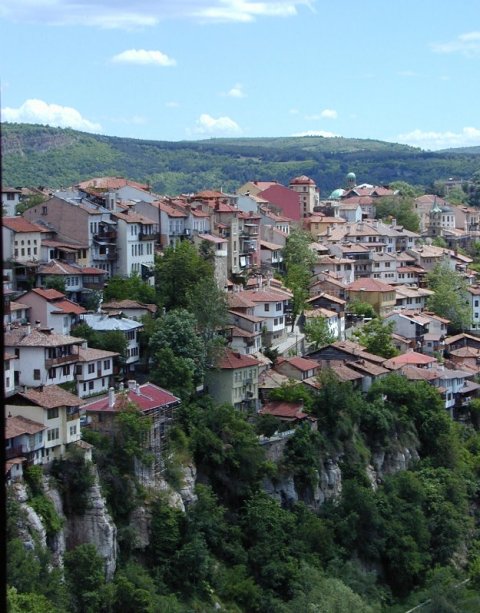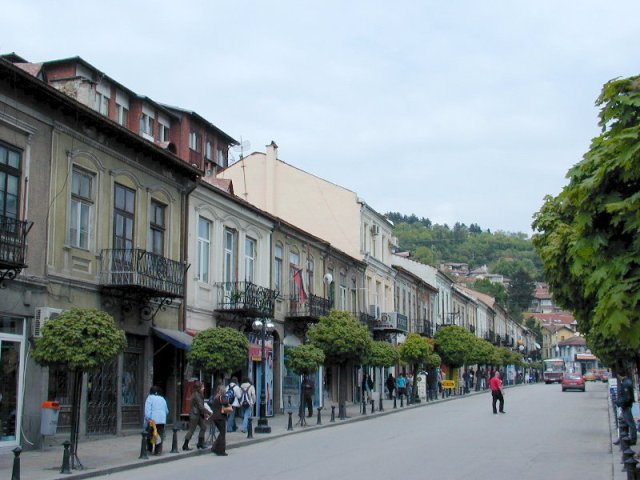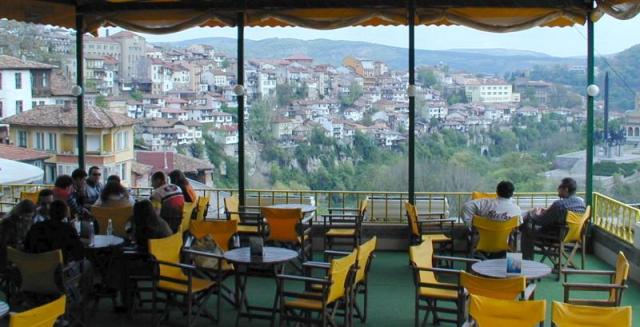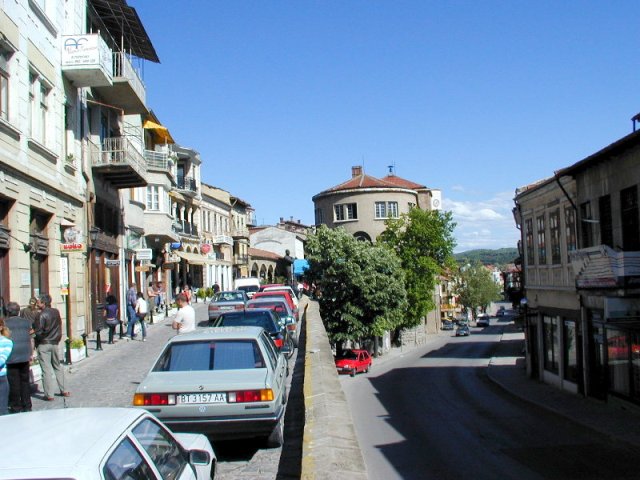On the middle ground - Veliko Tarnovo, Bulgaria
 Sit in a cafe on one of Veliko Tarnovo's terraces, jutting out from a green hillside like tiers of theatre seats, and you understand why Tsar Peter II decided to put Bulgaria's capital here. Beyond the Yantra river, curling around the base of one of the biggest fortresses in the Balkans, lies fertile farmland and the thickly wooded foothills of the Stara Planina mountains - a barrier that would have stopped any medieval warlord in his tracks.
Sit in a cafe on one of Veliko Tarnovo's terraces, jutting out from a green hillside like tiers of theatre seats, and you understand why Tsar Peter II decided to put Bulgaria's capital here. Beyond the Yantra river, curling around the base of one of the biggest fortresses in the Balkans, lies fertile farmland and the thickly wooded foothills of the Stara Planina mountains - a barrier that would have stopped any medieval warlord in his tracks.
While Tarnovo's historic centre was protected under Communism, its outskirts are still littered with disused factories and other relics of a command economy. But the city is emerging from shabbiness. A gleaming brewery, newly renovated hotels and traffic jams in steep, cobbled streets all suggest that investment in Bulgaria is no longer restricted to Sofia, its modern capital, and its Black Sea resorts. New jobs in tourism and services are helping reduce unemployment. And unlike many provincial cities that have suffered massive emigration by young people, Tarnovo has a lively nightlife, thanks to the presence of 10,000 students at Saints Cyril and Methodius University.
Already a popular weekend destination for Bulgarians, the Tarnovo region is attracting more second-home buyers as coastal and ski resorts become overbuilt. It is equidistant from two main international airports at Sofia and Varna and it takes about three hours to drive the 200km from each. There is also now talk of rehabilitating a disused military airport just north of the city for use by domestic and low-cost European operators, which would greatly improve access.
Tarnovo's position at a Balkan crossroads - the Danube is less than two hours' drive to the north - means there is plenty to explore in the surrounding area, from frescoed monasteries to the sprawling ancient Roman city of Nicopolis ad Istrum, founded after the emperor Trajan pushed back invading tribes from Romania. European Union pre-accession funds have enabled local municipalities to open eco-trails for hikers that link several villages through the woodlands. Trout and perch fishing is a popular activity with local residents. And some foreign residents have obtained official hunting licences and joined local clubs that organise wild-boar hunts.
Just as on the Black Sea coast, property prices have tripled in the past three years, says Krasimir Bakardzhiev of Bulgarian Properties. The difference is that in Tarnovo, where building regulations are strictly enforced because of its architectural heritage, well-located properties and sites for development are in short supply. "There's pretty much nowhere left to build in the old part of the city, so developers are picking sites that are 10 or 15 minutes' drive away and speculators are buying old houses in villages."
Tarnovo is becoming a hub for Bulgarian commuters and foreign homeowners living in a 20km radius around the city, Bakardzhiev adds. Local developers have snapped up plots in nearby villages with woodland or mountain views. New buildings follow traditional architectural styles, with wooden balconies and an overhung second storey, but interiors are modern, with large open-plan kitchens and several bathrooms.
Two new foreign-backed developments near the city highlight this trend in different ways. Veliko Tarnovo Hills, a 50m Israeli-Bulgarian project, is 2.5km on the edge of broad-leaf woodland. Due to be completed in 2009, it includes 500 apartments and 45 semidetached houses with views of the old city and a central shopping and recreation area. Prices start at about 45,000 for a two-bedroom apartment with a garage. Gesha View, a hilltop site about 20km south-west of Turnovo close to the village of Dryanovo, is being developed by UK-based SimpliBulgaria. It will be a self-contained community of about 150 new properties - apartments, townhouses and detached homes - built in Bulgarian style with modern touches including retractable windows and the latest in communications technology. Residents will be able to enjoy the kind of leisure features associated with a high-end seaside development - a spa centre, restaurants, shops and an infinity swimming pool the size of a small lake - all transplanted to a rural setting. Prices start at 36,000 for a one-bedroom apartment and rise to 188,500 for a four-bedroom detached house.
Gesha aims for year-round occupation, taking advantage of its position in the lush Stara Planina foothills, with activities ranging from horse trekking and mountain biking to cooking and wood-carving classes with local experts. Ilia Bulgarov, the site director, says it should appeal as much to wealthy Bulgarians seeking a westernised lifestyle as to northern europeans looking for a new cultural experience. SimpliBulgaria's experiment is being closely watched by local developers, who say its success will depend on the quality of recreation offered. If it works, the Gesha model is expected to spread elsewhere in rural Bulgaria.
For the majority of buyers, however, Tarnovo's best opportunities like in acquiring and renovating traditional village houses, says Stephane Lambert of Stara Planina Properties. A British urban planner, he came to the area in the 1990s to work on a United Nations-backed project restoring the facades of 19th -century townhouses built during the Bulgarian Revival period following independence from Turkish rule. He decided to stay and launched a property business that was swamped with e-mails after Tarnovo was featured in the UK television series A Place in the Sun.
Lambert says the Tarnovo region attracts buyers who "plan to spend a considerable amount of time here after they retire" and want "to participate in rural life as it used to be". The most popular type of village home has a roofed gateway with tall wooden doors leading into a dry-stone-walled garden of 1,000-2,000 sq metres, dotted with Photolibrary fruit trees. A typical two-storey house has three or four bedrooms and a basement mehana for storing firewood, wine and preserves but which also serves as a winter living room. A high percentage of properties include at least one other building, usually a rectangular barn with exposed wooden beams as well as an open-sided summer kitchen area with a stone fireplace.
Even after three years of hectic home-buying activity there is still plenty of choice in the villages south of Tarnovo. Many houses have been vacated and sold off as young people move to cities to find jobs and the older generation joins them. Prices are levelling off this year after rising steeply in the run-up to Bulgaria's entry to the EU last January.
While you can still buy a 150-year-old rain for 10,000, the price of a three- or four-bedroom house in need of renovation with a walled garden and collapsing barn has reached 35,000-45,000. Depending on the choice of materials and extra work, such as rebuilding a barn or installing a swimming pool, the cost of conversion is likely to reach 50,000-60,000.
"We've reached the point where buyers should start thinking in terms of a long-term investment," Lambert says.
Leslie Burgess, a property developer in the UK, explored half a dozen villages before settling on a 200-year-old house in Kereka, south-west of Tarnovo. His property has a 1,500 sq metre garden and a stunning view across the trees to a distant line of mountains. "The house was falling down but the site was spectacular," he says. "And I like the sense of community. People here are very helpful if there's a problem."
The boom in renovations has started to put pressure on local contractors. Some builders are hiring workers from Ukraine in order to keep projects on track. Skilled stoneworkers able to repair the walls of a traditional compound are in short supply, as are carpenters who can replace oak ceiling beams and floors. "The work's done to a good standard and builders deliver on time but you may have to look around for specialist craftsmen," Burgess says.
Tim Ferdinand, a former investment banker, has been pursuing a series of local building projects together with Bulgarian and UK-based partners since he bought and restored a traditional gated house in Velchevo, a village 15 minutes drive from Veliko Tarnovo. You can find almost everything you need locally - quality furniture makers, out-of-town stores selling household equipment, satellite television providers," he says.
He is now converting three ruined properties in the village of Gostilitsa, as well as building five new homes at Popovtsi on a hillside overlooking the Stara Planina national park and says he plans to market them to Bulgarian as well as to foreign buyers. Earlier this year he and his partners bought the former village school in Velchevo along with its contents - among them battered wooden desks and faded files of correspondence with the education ministry going back more than 80 years. The large high-ceilinged schoolrooms overlooking a sheltered garden could be restored as unusual holiday apartments or perhaps a small hotel, he says.
"The villages round here remind me of staying in the south of France when I was a child - empty houses and collapsing roofs," he says. "I don't think it'll be long - perhaps less than a decade - before Tarnovo catches up with Provence."
read more articles
